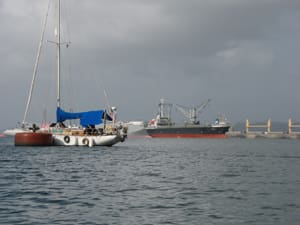To the editor: My husband Seth is always blowing his nose now that we live ashore. He says he’s allergic to land. “It’s all this dust and dirt. It’s not good for me.”
There might be a grain of truth in his jokes: neither of us were ever ill offshore during the four years we spent afloat. We did, however, get sick in port a few times. We carried many supplies in our first-aid locker aboard our Westphal 38 Heretic, including splints, a suture kit, prescription painkillers, rolls of gauze, and EpiPens. Fortunately, we never had need for most of it. But what we did use became our most valued medical supply: antibiotic pills.
The day before our Galápagos Islands permits expired, we were both severely incapacitated by bad kitchen hygiene at a local restaurant. It was supposed to be our farewell dinner; Seth and I planned to depart Santa Cruz Island for our 3,000-mile Pacific Ocean crossing the next morning. But by 0800, the chorizo dinner was on its way out both ends. Our permits expired as we alternated between our bunks and the head. An understanding port official gave us two extra days, but two days alone would not have cured us. We opened a container of Ciprofloxacin and read the instructions our doctors had given us prior to setting out on the voyage. By the time we weighed anchor, we were hale enough to stand watch and watch for a month.
The same thing happened again two and a half years later when Seth and I were hiking in South Africa. We had suffered no ill health across the Indian Ocean or on the rough passage across the Agulhas Current, but breakfast inland in the bushveld laid us low. Pills came to the rescue.
The most painful illness I suffered on our voyage was the most difficult to cure. While transiting the Panama Canal, I made the mistake of taking a bucket shower in Gatun Lake. A few days later, my right ear started to ache. It grew worse until I suspected it was infected. I went to a doctor who prescribed a two-week course of penicillin, which I finished according to his directions. That seemed to cure me, and although I occasionally felt an uncomfortable ache, it was nothing like the initial infection.
That was until we reached Fiji, when the throbbing pain flared up worse even than in Panama. It became so agonizing that I couldn’t sleep. Scuba diving was out of the question. I still had my souvenir from Gatun Lake.
I had no idea how to cure it. Seth and I were a full day’s sail from the nearest clinic, but I had seen the clinic and I knew that Heretic’s giant first-aid kit was better equipped. What I didn’t know was which antibiotics to take and how many milligrams. Clearly the bacteria causing the infection was resistant to penicillin, the drug I had first taken in Panama. I needed a well-trained doctor.
Seth and I have found that all around the world voyagers are keen to become friends and help each other. For me the greatest instance of this was in Fiji. There were only three other yachts in the bay with us, but in a bit of good luck, one had an English doctor. Hearing of my predicament, Dr. Beth rowed over to inspect my ear. “You’ve got a terribly bad infection,” she confirmed. I told her about the penicillin I had taken before, and she agreed I shouldn’t take it again. She wrote down a dosage of another antibiotic. “Make sure you take the whole course, even after you think it’s gone away. Otherwise it will become resistant to that as well.” Ten days later, Seth and I were diving on the Rainbow Reef.
When Seth and I returned to America a few months later, leaving Heretic in Australia for the cyclone season, I saw my doctor for a physical and I mentioned the persistent ear infection. Although I thought it had disappeared, she decided to send a culture to the lab. The results showed it was resistant to all the antibiotics they had tried save one: Cipro. “Don’t feel like it’s your fault, though,” she assured me. “There’s no way you would have known how robust this bacteria is without a culture.”
While it’s good to have a well-equipped first-aid kit, voyagers should use medications correctly. For antibiotics it is essential to finish your entire course, even if your illness seems to go away, and to avoid expired pills. Failing to do so may allow the bacteria to grow resistant to the drug, which is not only a problem for you but can create a public health hazard. This was not the case with my ear infection; it happened to be particularly strong, something no one knew until it was tested in a laboratory.
Since sailors must put into port at some time or other, staying healthy ashore is most easily done in our experience by dining on your own yacht where your food hygiene is up to standard. Bathing in the Panama Canal is also strongly discouraged.
—————–
Ellen Massey Leonard recently completed a more than three-year, 32,000-nm circumnavigation with her husband Seth aboard their Westphal 38, a semi-custom fiberglass masthead cutter built in 1968 and modeled after the Sparkman & Stephens yacht Finisterre.

